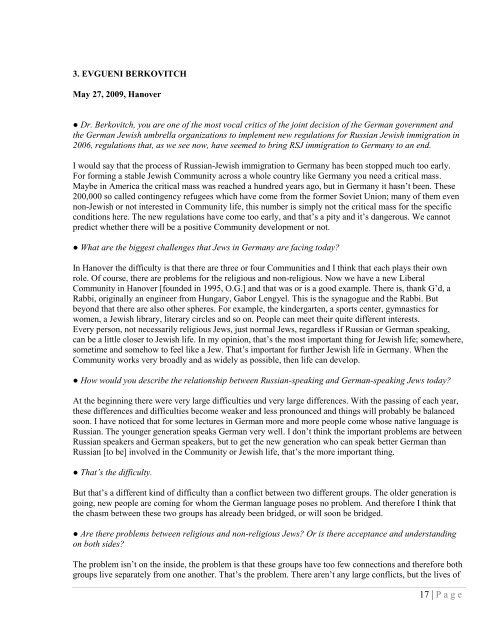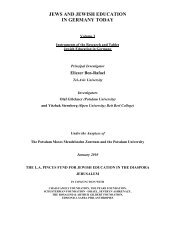jews and jewish education in germany today - The Westbury Group
jews and jewish education in germany today - The Westbury Group
jews and jewish education in germany today - The Westbury Group
You also want an ePaper? Increase the reach of your titles
YUMPU automatically turns print PDFs into web optimized ePapers that Google loves.
3. EVGUENI BERKOVITCH<br />
May 27, 2009, Hanover<br />
● Dr. Berkovitch, you are one of the most vocal critics of the jo<strong>in</strong>t decision of the German government <strong>and</strong><br />
the German Jewish umbrella organizations to implement new regulations for Russian Jewish immigration <strong>in</strong><br />
2006, regulations that, as we see now, have seemed to br<strong>in</strong>g RSJ immigration to Germany to an end.<br />
I would say that the process of Russian-Jewish immigration to Germany has been stopped much too early.<br />
For form<strong>in</strong>g a stable Jewish Community across a whole country like Germany you need a critical mass.<br />
Maybe <strong>in</strong> America the critical mass was reached a hundred years ago, but <strong>in</strong> Germany it hasn’t been. <strong>The</strong>se<br />
200,000 so called cont<strong>in</strong>gency refugees which have come from the former Soviet Union; many of them even<br />
non-Jewish or not <strong>in</strong>terested <strong>in</strong> Community life, this number is simply not the critical mass for the specific<br />
conditions here. <strong>The</strong> new regulations have come too early, <strong>and</strong> that’s a pity <strong>and</strong> it’s dangerous. We cannot<br />
predict whether there will be a positive Community development or not.<br />
● What are the biggest challenges that Jews <strong>in</strong> Germany are fac<strong>in</strong>g <strong>today</strong>?<br />
In Hanover the difficulty is that there are three or four Communities <strong>and</strong> I th<strong>in</strong>k that each plays their own<br />
role. Of course, there are problems for the religious <strong>and</strong> non-religious. Now we have a new Liberal<br />
Community <strong>in</strong> Hanover [founded <strong>in</strong> 1995, O.G.] <strong>and</strong> that was or is a good example. <strong>The</strong>re is, thank G’d, a<br />
Rabbi, orig<strong>in</strong>ally an eng<strong>in</strong>eer from Hungary, Gabor Lengyel. This is the synagogue <strong>and</strong> the Rabbi. But<br />
beyond that there are also other spheres. For example, the k<strong>in</strong>dergarten, a sports center, gymnastics for<br />
women, a Jewish library, literary circles <strong>and</strong> so on. People can meet their quite different <strong>in</strong>terests.<br />
Every person, not necessarily religious Jews, just normal Jews, regardless if Russian or German speak<strong>in</strong>g,<br />
can be a little closer to Jewish life. In my op<strong>in</strong>ion, that’s the most important th<strong>in</strong>g for Jewish life; somewhere,<br />
sometime <strong>and</strong> somehow to feel like a Jew. That’s important for further Jewish life <strong>in</strong> Germany. When the<br />
Community works very broadly <strong>and</strong> as widely as possible, then life can develop.<br />
● How would you describe the relationship between Russian-speak<strong>in</strong>g <strong>and</strong> German-speak<strong>in</strong>g Jews <strong>today</strong>?<br />
At the beg<strong>in</strong>n<strong>in</strong>g there were very large difficulties und very large differences. With the pass<strong>in</strong>g of each year,<br />
these differences <strong>and</strong> difficulties become weaker <strong>and</strong> less pronounced <strong>and</strong> th<strong>in</strong>gs will probably be balanced<br />
soon. I have noticed that for some lectures <strong>in</strong> German more <strong>and</strong> more people come whose native language is<br />
Russian. <strong>The</strong> younger generation speaks German very well. I don’t th<strong>in</strong>k the important problems are between<br />
Russian speakers <strong>and</strong> German speakers, but to get the new generation who can speak better German than<br />
Russian [to be] <strong>in</strong>volved <strong>in</strong> the Community or Jewish life, that’s the more important th<strong>in</strong>g.<br />
● That’s the difficulty.<br />
But that’s a different k<strong>in</strong>d of difficulty than a conflict between two different groups. <strong>The</strong> older generation is<br />
go<strong>in</strong>g, new people are com<strong>in</strong>g for whom the German language poses no problem. And therefore I th<strong>in</strong>k that<br />
the chasm between these two groups has already been bridged, or will soon be bridged.<br />
● Are there problems between religious <strong>and</strong> non-religious Jews? Or is there acceptance <strong>and</strong> underst<strong>and</strong><strong>in</strong>g<br />
on both sides?<br />
<strong>The</strong> problem isn’t on the <strong>in</strong>side, the problem is that these groups have too few connections <strong>and</strong> therefore both<br />
groups live separately from one another. That’s the problem. <strong>The</strong>re aren’t any large conflicts, but the lives of<br />
17 | P a g e



